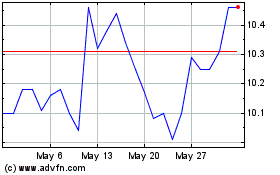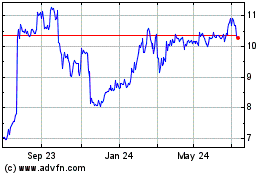Treasury Department Reviewing Retaliatory Tax Law Against EU
March 04 2016 - 3:30PM
Dow Jones News
WASHINGTON—The U.S. Treasury Department said it is "closely"
reviewing a never-used 82-year-old law that would impose
retaliatory double taxes on European Union companies and
individuals.
The law is being investigated following objections from the
Treasury and a bipartisan group of senators to the European
Commission's "state aid" investigations, which the U.S. officials
contend disproportionately target U.S. firms in an effort to claw
back European tax breaks.
The retaliatory double tax represents the most concrete—and
confrontational—way the U.S. could respond to the EU
investigations.
The Treasury said it is studying Section 891 of the Internal
Revenue Code, which allows the president to double U.S. taxes on
individuals and corporations from countries that are deemed to have
subjected U.S. citizens and companies to "discriminatory or
extraterritorial taxes."
"We are reviewing this provision and its history closely, and we
are continuing to consider all modes of engagement to convey our
strong view" that European officials should reconsider their
approach to the issue, wrote Anne Wall, the assistant Treasury
secretary for legislative affairs, in a letter dated March 2.
In the letter, which was a response to a January request from
Senate Finance Committee Chairman Orrin Hatch (R., Utah), Ron Wyden
(D., Ore.), Rob Portman (R., Ohio) and Charles Schumer (D., N.Y.),
the Treasury also noted that no president has ever invoked this
portion of the code.
EU officials have said they are applying long-standing legal
principles and they aren't disproportionately targeting U.S.
companies. The probes include investigations of Apple Inc. and
Amazon.com Inc., as well as non-U.S. companies, such as BP PLC and
BASF SE.
European regulators have been investigating whether tax breaks
in individual countries, such as Belgium, Ireland and Luxembourg,
violate rules against excessive government aid to companies. If
deemed illegal, European officials could then press the countries
to recover corporate funds related to the tax breaks.
When U.S. companies pay taxes abroad, they receive tax credits
against their eventual U.S. tax liability. They pay the residual
U.S. tax when they repatriate they money—but U.S. lawmakers are
considering a mandatory one-time tax on foreign profits as part of
a major revamp of the tax system
"While Treasury has clearly signaled a sense of disappointment
and concern regarding the European Union's state aid investigation,
it's imperative the administration stays the course," Mr. Hatch
said on Friday in response to the Treasury's letter.
"Treasury should remain vigilant in oversight and be prepared to
take action to ensure American businesses do not fall
victim—retroactively—to a novel legal theory that undermines the
U.S.-EU tax treaty network and disproportionately targets U.S.
companies," he said.
Write to Richard Rubin at richard.rubin@wsj.com
(END) Dow Jones Newswires
March 04, 2016 15:15 ET (20:15 GMT)
Copyright (c) 2016 Dow Jones & Company, Inc.
Pacific Current (ASX:PAC)
Historical Stock Chart
From May 2024 to Jun 2024

Pacific Current (ASX:PAC)
Historical Stock Chart
From Jun 2023 to Jun 2024
